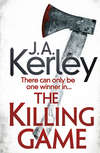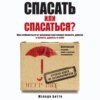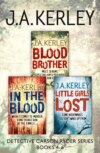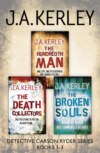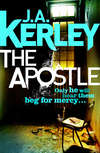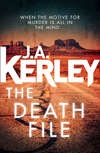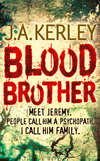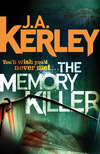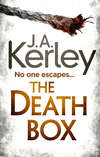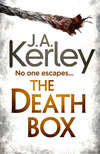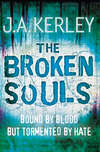Loe raamatut: «The Killing Game»
The Killing Game
J.A. Kerley

Dedication
To Alexa and John, Have a spectacular voyage
Table of Contents
Cover
Title Page
Dedication
Chapter 1
Chapter 2
Chapter 3
Chapter 4
Chapter 5
Chapter 6
Chapter 7
Chapter 8
Chapter 9
Chapter 10
Chapter 11
Chapter 12
Chapter 13
Chapter 14
Chapter 15
Chapter 16
Chapter 17
Chapter 18
Chapter 19
Chapter 20
Chapter 21
Chapter 22
Chapter 23
Chapter 24
Chapter 25
Chapter 26
Chapter 27
Chapter 28
Chapter 29
Chapter 30
Chapter 31
Chapter 32
Chapter 33
Chapter 34
Chapter 35
Chapter 36
Chapter 37
Chapter 38
Chapter 39
Chapter 40
Chapter 41
Chapter 42
Chapter 43
Chapter 44
Chapter 45
Chapter 46
Chapter 47
Chapter 48
Chapter 49
Chapter 50
Chapter 51
Chapter 52
Chapter 53
Coming Soon: The Death Box
Acknowledgements
About the Author
Also by the Author
Copyright
About the Publisher
Chapter 1
“It sounds like a helluva movie,” David Letterman was saying to the popular movie actor. “Great cast …”
Gregory leaned toward the foot-square mirror propped against the DVD player beside the television. The actor was performing the most complex series of faces Gregory had ever attempted. He reset the DVD to seconds before the faces began, when David Letterman asked his guest – who had a wife and three small children – about a rumored affair with his latest co-star.
“I guess I’d be remiss in my hostly duties if I didn’t ask about your relationship with your lovely co-star, Maria Glassier. You guys shared, uh, a love scene or two, right?”
The audience gasped, tittered, awaited the reply. Gregory pressed Play on the machine. The actor’s faces began …
Face one: the actor’s eyes popped wide. Gregory replicated the face in the mirror set atop the player. But this was a simple face he called Sudden Surprise #3 and employed dozens of times a week.
Face number two started, eyes moving side to side, rising at the corners as if swinging on pendulums, the mouth dropping open. Gregory tapped Pause. It was a difficult move, the eyes wanting to stutter instead of glide. And moving eyes couldn’t be followed in the mirror. But he’d practiced into a video camera until satisfied, so he trusted the face.
The last face was the toughest: four separate actions, but Gregory had deconstructed the components and mastered each. Today was about flow. Gregory felt his intestines squirming and reached to the floor for the bottle of Pepto-Bismol. He drank and restarted the player. The actor’s lips tightened, eyes rolling heavenward, eyebrows flicking, the head cocking to a thirty-degree angle.
Gregory’s first attempts felt ragged; the head-cock started before the lip-tightening, or he forgot the eyebrow lift after the eye-roll. Gregory’s jaw tightened in exasperation. The food in his guts turned into cramps and sour, flatulent gas. He smelled the ugly vapor from his bowels and began to shake in his chair, angered by failure …
Do Relaxed Face #1, he told himself. Then do Quiet Face.
Gregory took a deep breath and performed faces that relaxed him. His guts settled down. After a minute of visualizing, Gregory re-performed face three, nailing it five times in a row. Satisfied, he pressed Play.
The difficult faces were over. The actor’s smile widened until it eclipsed every other feature on his face.
“I’m afraid we’re just good friends, Dave,” the actor said.
The audience laughed and applauded. Gregory put his hand over the actor’s lower face. Without the distraction of the tooth-bright smile and uplifted cheeks, the actor’s eyes were points of angry fire. Gregory knew the actor wanted to grab Letterman’s throat and rip it from his body, holding the wet and dangling esophagus aloft like a prize. The actor had ached to do this since Letterman asked the moronic question, but instead projected a meticulous series of facial expressions ending in a glittering smile.
He fooled everyone.
And one day, Gregory thought, if the actor is a careful planner, he can track down and kill Letterman, and no one will ever know.
He turned off the DVD player. Gregory’s cell phone rang in his pocket and he pulled it out with irritation, saw the name EMA on the screen, her third call today. He stuck the phone back in his pocket and practiced facial moves as he left the room, its walls plastered with faces from magazine ads. Beneath each was a descriptor: Happy #4, Not Pleased With Someone’s Answer, New Car, Hurray!, I Love You #3 and over two hundred others. He rested his finger on the light switch and turned his eyes to his faces.
He showed them I’m Glad You’re Here and flicked out the light.
Chapter 2
The coins in the cash-register drawer jingled as I slammed it shut. The bleached-blond iron-pumper on the customer side of the counter started to turn away, but spun back to the lottery tickets beside the register, his guayabera shirt open to display a stunning collection of gold chains around a ham-thick neck. I’d just rung up his purchase of a pack of Marlboros, a half-case of Miller Lite and a three-pack of Trojan condoms. The beer was selling briskly tonight, thanks to a display of discounted twelve-packs fronting the nearest aisle. Condoms weren’t doing too bad either, but then it was Saturday night.
Ham Neck tapped the ticket dispenser. “Gimme four Hot Odds scratch-offs and a dozen Super Lottos.”
“You couldn’t think of that before I rang you up?”
His lamp-tanned face twisted into a snarl. “Here’s how it works, moron: I’m the customer, you’re the clerk. I want something, you shut up and get it for me.”
“Stay calm, Carson,” said a voice in my head as I bit my tongue and peeled tickets from the dispenser. I glanced up and barely registered a skinny guy in a grubby denim jacket turning down the first aisle. Outside, a teen kid who’d just bought condoms and two Dr Peppers climbed into what had to be Daddy’s white Yukon. The kid was grinning ear to ear, the girl looked uncertain.
Though it was forty minutes past midnight, outside the store it was as bright as high noon in the Sahara, a zillion watts lighting a dozen gasoline pumps on a half-acre of concrete. It was even brighter inside and on my first day I’d wondered if I needed sunscreen. There was an experienced manager on the shift – the three-hundred-sixty-pound Melvin Dobbs – but it was Mel’s break and he’d booked to a nearby Waffle House to give his diabetes something to think about.
“C’mon, hurry up with those tickets,” Ham Neck said. “I ain’t got all night.”
A shag-haired, net-hosed hooker by the coolers held up two forties of malt liquor.
“This all you got left of the Colt 45?”
“If that’s what you see,” I said, “that’s what we got.”
She shook her head. “How ’bout y’all stock this joint once inna while?”
I took Ham Neck’s money for the lottery tickets. He expressed appreciation by telling me the floors were filthy and did I know how a mop worked?
“Easy, Carson,” the voice said in my head.
Monitors from the security cameras sat to the right of the clerk station, two cameras inside, two outside. One was panning past the coolers and I saw the hooker opening her outsized purse, ready to drop a forty into it.
“Don’t even think about it, lady,” I yelled. She scowled and set the bottle back in the cooler. A seventyish black man in a blue porkpie hat was at the grill station, nodding at wrinkled brown hot dogs spinning on heated rollers.
“How long these weenies been cookin’?” he said.
I feigned uncertainty. “What year was the Crimean War?”
“The hell’s that mean?”
“Carson,” said the voice in my head. “Be nice.”
“About four hours,” I said.
“Can I get a discount cuz they’re so old?”
It was my second Saturday as a clerk working the midnight-to-morning shift. In the past six weeks there had been three Saturday-night convenience-store robberies, two ending in deaths. The third clerk was comatose, likely to remain that way. The C-stores had been just off I-10 on Mobile’s southwest side. This was the only one in the quadrant that hadn’t been robbed. My partner, Harry Nautilus, and I had judged it ripe for a hit.
“What about these weenies?” the porkpie-hat guy bayed. “They too old to be full price.”
I checked the outside monitors, seeing a gray van slide into the rear of the lot and disappear until it was picked up on the second outside camera. It rolled into the shadows beside the dumpster.
“Gray van,” said the voice in my head. “Get cautious.” A gray van had been spotted near two of the three hold-ups. Whenever one pulled in, the voice in my head alerted me to be careful.
“You got ten seconds to get out the door,” I told the old man. “But all the hot dogs you can grab in that time are free.”
The guy gave me two beats of are-you-for-real? then started jamming hot dogs in his pockets.
“Hey,” the hooker whined. “How ’bout me?”
“We’re having a special on malt liquor, ma’am. Two for the price of none.” I nodded toward the old guy. “But you gotta beat him out the door or the deal’s off.”
She grabbed the forties and booked, the old guy in her wake, two hot dogs in his mouth like pink cigars, four in each hand, a box of buns beneath his arm. Before the door closed it was caught in the hand of a petite brunette in her thirties: brown cargo pants, pink blouse, white running shoes. She saw me watching, waved and smiled and headed toward the snack aisle. She’d exited the gray van but my glance hadn’t picked up any threat. There were a lot of gray vans on the road.
“Check the customers,” the voice whispered. I did a head count. Exactly two people inside, me and the woman. The lot was empty. The woman came to the register with a bag of chips in one hand, flipping open a cheap cell with the other.
“Be a buck-eighty-seven,” I said.
She pressed a button on her phone and opened a brown leather purse. Though the woman had looked fine from afar, up close I saw hair days from a washing. Half-moons of grit under chewed fingernails. Pupils so dilated I couldn’t discern an eye color. I was moving my hand toward the weapon in the small of my back, beneath my uniform jacket, when I heard a shotgun rack behind me.
“Move and you’re dead,” a male voice said.
I froze as the woman across the counter pulled a black automatic from her purse. I knew the model: cheap Eastern-European manufacture with a trigger-pull so congenitally light it might fire if a mouse sneezed in the parking lot.
“Open the register,” she said, pointing the weapon at my throat. “Now.”
I nodded acquiescence and started tapping keys on the machine.
“Hold on,” the voice behind me whispered. “Some asshole comin’ in the door.”
I looked up and saw Ham Neck returning, straight-arming the door open. “You gave me the wrong goddamn cigarettes,” he snarled, waving the pack. “I told you menthol.”
The woman slid her purse up to cover the pistol and stepped to the side. The guy at my back whispered, “Get the fucker gone or you’re dead.” The gunman slipped to the end of the counter and I grimaced. It was the guy in the dirty denim jacket I’d noticed not five minutes ago. He must have waited in the restroom until the woman’s cell-phone signal told him the store was empty of customers.
My first job was getting the big buffoon out the door. I grabbed as many packs of smokes as I could hold, threw them Ham Neck’s way, one bouncing off his chin.
“They’re free,” I said. “Compensation for my mistake. Sorry. Goodbye.”
“You trying to be a wise-ass?”
“I’m sorry,” I said quietly. “My mistake. Please, take your smokes and go.”
But Ham Neck was one of those guys who look for slights. He strode toward me, one hand in a fist, the other thrust out and showing me the finger.
“Throw stuff at me? I oughta kick your goddamn—”
The man at the end of the counter whipped up a sawed-off twelve-gauge and fired. It sounded like a cannon. Ham Neck’s finger and hand disappeared in a red mist. He fell to the floor screaming, arterial blood spurting from his stump. The woman pulled the Czech weapon for the kill-shot. I stepped between them.
“I can open the safe,” I said, hands in the air. “There’s maybe three hundred bucks in the register. There’s at least six grand in the safe.”
She looked to Shotgun Man and he must have assented. Her eyes were unhinged, one fixed on me, the other on some hellish inner vision.
“Do it,” she said.
I nodded down at the moaning Ham Neck. “I gotta fix his arm.”
“I’ll kill you.”
“It’ll cost you over six thousand dollars.”
Her knuckles whitened on the gun, the chemicals in her head about to reach full boil.
“I can cut the lights and close down,” I reasoned. “We’ll be alone.”
Her eyes flicked to Shotgun Man. He thought about how many drugs six grand would buy and followed me to a panel behind the counter. I turned off every light outside and inside, leaving the glow from the coolers. Ham Neck was rolled in a ball and grunting as his stump painted the floor red. I could feel my gun against my back, but had two weapons trained on my head. No way to pull my piece.
I yanked a bungee cord from a display and snapped a tourniquet around Ham Neck’s forearm. He was slipping into shock. Move them to the front, the voice in my head said. I spun and walked to the front door.
“Stop right there.” The woman pointed the pistol at my forehead. It was shaking in her hand like a trapped bird.
“I have to lock the door,” I said, pulling my car keys. “The safe won’t open unless the front door is locked. You ever hear of an entry-securified safe before?”
The invention worked and she gestured me forward with the twitching muzzle of the nine.
“Wait,” Shotgun Man said. “Someone’s outside.”
A big square black guy in a Hawaiian shirt had parked beside the air pump and was kneeling by the front tire of a dark sedan. He looked unsteady and kept dropping the air hose.
“Just some drunk putting air in his tires,” I said, slipping my truck key into the lock and jiggling. I moved my hand back like I’d locked the door. Then pulled it open. “It’s bent,” I said, making a big deal of wiggling the door. “Some old lady banged her car into the door last week.” I did the key-jiggle again. Opened the door.
“GET IT DONE!” the woman screamed.
I turned to Shotgun Man. “If we both pull from the inside I can slide the bolt.”
He set the sawn-off on the counter and came to stand beside me. He smelled like an outhouse.
Shotgun Man looked to the woman. “He makes one wrong move, blow out his brains.”
“On the count of three,” I said. “Pull hard and I’ll set the lock.”
Shotgun Man gripped the door handle. I slid my key into the lock and shot a glance at the drunk at the pump. He was leaning against his vehicle and scratching his belly, apparently exhausted by his labors.
“One!” I said, loudly, taking a deep breath.
“Two!”
On three, I dove to the floor as glass exploded everywhere. Shotgun Man seemed to pirouette in slow motion, then hit the ground beside me. A half-beat later the woman’s body slammed the floor as well, half her skull gone. There was nothing to be done for either of them, but if there had been, I probably wouldn’t have done it.
Two cop cruisers skidded into the lot. The black guy was standing beside the car with a gun in his hand, smoke drifting from the muzzle. He spoke into a small transceiver in his palm. “Looks like your clerking career is over, Carson,” the voice in my head said. “You OK?”
I waved, pulled the tiny WiFi speaker from my ear, and ran to check on Ham Neck.
Chapter 3
The waitress brought Ema her breakfast and Gregory stared at the plate of unspeakable monstrosities. He hid his revulsion behind Happy #3 as the waitress smiled and backed away. Chewing food formed a bolus, a clot of spit and snot and food churned by the tongue and squeezed down the throat like a rat wriggling through a python. The bolus caused the stomach to squirm and convulse as chemicals reduced the lump to a suppurating goo. This reeking sludge was pumped past the pyloric valve and into the intestines, where it turned into unspeakable filth that decayed inside you for days.
“Are you all right, dear?” Ema asked as the server arrived with Gregory’s toast and salad. Grains and green vegetables were easiest to digest.
“Why?” he said.
Ema cocked her head, teased-out blonde curls bouncing on the shoulder of her pale and frilly summer frock.
“You looked deep in thought.”
Gregory pushed his plate of half-eaten toast aside. “Exactly, Ema, I was thinking. Until you interrupted.”
“I’m sorry,” Ema apologized. “Was it about work?”
“What else?” he lied. “I’ve put in forty hours already this week.” Another lie.
Ema forked up a gooey lump of poultry ovum. “I’m glad to see you so absorbed in life, dear. Plus you’re looking less thin and frail.”
Gregory’s eyes narrowed. Frail? I’ve never looked frail. Ema’s constant sniping about his pallor and thinness had driven Gregory to a health club membership four months back, but the stink of bodies turned his stomach and the music hurt his head. That’s when he’d invested in a top-of-the-line Bowflex home gym. He could run through a full workout in under a half hour and practice his faces at the same time.
He said, “I’ve been exercising.”
“Wonderful!” Ema chirped. “How often do you work out? Do you have a specific regimen?”
“Not really.”
“Do you exercise to a DVD or anything like that?”
“No.”
“You should drop in on Dr Szekely. She’d love to see how you—”
“Your nattering is driving me mad, Ema.”
Ema swallowed hard, looked away. “I’m sorry,” she said, her voice breaking. “I only want for you to—”
“I’m teasing, dear,” Gregory said. “Can’t you tell by now when I’m teasing?”
“Sometimes you look, I don’t know … serious, I guess. Even when you’re teasing.”
“If you can’t tell whether I’m teasing, then I’m teasing.”
“I love you so much,” Ema said. “I want you to be healthy and strong.”
“I am healthy, Ema,” Gregory said. “I just said I’ve been working out. Didn’t you listen?”
Ema’s eyes fell to her lap, telling Gregory he’d failed to keep all the anger from his voice. He sighed internally and reached for his sister’s plump fingertips, feeling microbes crawl from her flesh to his. But the gesture – I Love You and I’m Sorry – was important. Gregory found his most sincere face – This is the Best Insurance You Can Buy – and looked Ema in her green eyes.
“I’m so glad I have you,” he said. “So very happy.” He followed with three beats of I Have a Powerful New Detergent.
A newly buoyant Ema carried the conversation for twenty minutes, Gregory’s contributions being murmurs of assent and smiling in all the right places. He averted his eyes when a fork moved toward Ema’s mouth, looking instead at the ubiquitous pendant hanging from her neck, a shimmering pearlescent orb the size of a robin’s egg, folk craft from Eastern Europe. She had other baubles on her wrists, jangly things. The woman spent her life watching shopping channels and soap operas and police shows. Gregory had started wishing she’d get a full-time job or some kind of hobby.
“How are the kitties?” Ema asked, returning to a recent topic, a population of stray cats in Gregory’s neighborhood.
“Still howling all night. It’s breeding season.”
Ema paused in chewing, the fork poised beside her mouth. “A friend of mine had a problem with stray cats. She caught them in what’s called a humane trap and—”
“What the hell is a humane trap?”
“It’s like a box made of wire mesh. The cat goes in and a door springs shut. Then off to the shelter.”
“I’ll consider it,” Gregory said, thinking a shotgun would be easier.
Ema’s fat breasts wobbled below the pendant as she turned to wave for the check, the ritual over for another few days. Ema picked up her purse, a beaded concoction the size of a bowler’s bag. Gregory watched her pudgy pink fingers scrabble for her wallet.
“It’s my turn to pick up the check, right, dear?” she said, staring into the junkyard of her purse.
“I’ll get it, Ema.” I don’t have twenty minutes for you to find your wallet. Though both had money from their inheritance, Gregory made additional money writing code for a company specializing in industrial controls. Ema had a part-time income doodling out chatty little women-directed newsletters for an HMO and insurance firm, and Gregory figured she did it while watching television.
The pair stood and Ema hugged Gregory so tight he smelled her body odor beneath the cloying perfume. After kissing his cheek – Gregory hiding the grimace – Ema waddled out to the parking lot.
Gregory went to the restroom and washed his hands for two minutes before opening the door with his elbow and striding toward the entrance. An elderly woman pushed the front door open and he jumped past her, drawing a sharp glance for the incivility, but he’d not had to touch anything.
On scene at the C-store until three a.m., I spent Sunday in busywork trying to push the attempted robbery from my mind. Sometimes it even worked for a couple minutes. When Monday arrived, I slept till nine, then walked the hundred paces from my stilt-standing home to the Dauphin Island beach, interrupting a flock of gulls and sending them into the cloudless sky.
I ran the sugar-white strand for three miles and returned, launching into the Gulf and swimming a leisurely down-and-back mile. Then I had breakfast on my deck – cheese grits and andouille sausage wrapped in a plate-sized flour tortilla, a grittito, in my parlance – and drank a pot of industrial-strength coffee with chicory. I felt steady again, Saturday night’s memories fading away. I climbed into a beater truck painted gray with a roller, and headed thirty miles north to Mobile, Alabama.
Almost summer, the coastal heat was nearing typical blast-furnace intensity, so walking into the chilled air of the Mobile Police Department felt delicious. Several colleagues called out as I walked the hall to the stairs.
“Hey, Carson, I need a bag of pretzels.”
“Ryder … now that I know you moonlight at a C-store, how’s about bringing in the Krispy Kremes?”
“Yo, CR … I need fifteen bucks on pump three.”
They were congratulating me, but being cops wouldn’t use those words. The accolades were in their grins. Or the thumbs up after the joke. I climbed the steps to the homicide department. Harry was on paid leave for three days, standard procedure for a cop involved in a killing.
“Carson!” a voice called. My supervisor, Lieutenant Tom Mason, stood at his office door, lean as a teenager though in his mid-fifties, wearing his cream Stetson and cowboy boots. Tom hailed from piney-woods Bama, but he always looked straight from a cattle drive across the plains. I banked in his direction.
“Chief Baggs wants to see you, Carson.”
I winced. “Why?”
“Probably something to do with last night. Make nice, Carson,” Tom said pointedly. “He’s the chief, right?”
I went upstairs to a hushed and carpeted row of offices inhabited by the brass hats of the department, crossing the floor with the same thought I get in funeral parlors: Where’s the nearest exit?
Chief Baggs’s personal assistant sat at a desk outside the closed door of his corner office. Though Darlene Combs was only in her late thirties, she’d already buried two husbands, one a suicide, the other OD-ing at a Jimmy Buffett concert. Her green eyes always seemed as irritated as her hair was red. I studied her outfit: a blue skirt hiked high to display plump thighs she thought slender; a white silk blouse a size too small, to highlight a pair of odes to silicone; and an Evan Picone jacket, to show she didn’t have to wear the big box knock-offs worn by the women on the lower floors.
Darlene said, “The Chief is very busy today.”
“He asked Lieutenant Mason to send me up here.”
“You’re not in the Chief’s appointment book.”
“Perhaps I’m in the footnotes.”
She tapped a button on her phone. “Chief?” she said. “Detective Ryder is out here.” She listened for several seconds, put the phone down. “He’s on the phone to the Mayor. It’ll be a few minutes.”
Every time I’d come here, I’d waited out a call to the Mayor. I once compared notes with Harry, who’d been here twice. Both times Harry cooled his heels while the Chief finished his consultations. Harry, ever the detective, had noted Baggs’s phone line wasn’t lit, but perhaps he communicated on a secret line like the Batphone.
Darlene returned to penciling a magazine page as I studied the walls, laden with photos of Baggs shaking every political hand in four states, including such Washington stalwarts as Alabama senators Jeff Sessions and Richard Shelby. Both men’s eyes seemed to say, Who is this geek at the end of my arm?
Though the degree in Police Administration was framed near center on the Wall of Baggs, most prominent was the law degree. The name of the institution was unknown to me, perhaps a correspondence subsidiary of Harvard or Tulane. While the bulk of the photos and certificates were in simple black frames, the degree was in a baroque gilt rectangle. It seemed a shade overwrought, but who was I to judge, being sans entrée into the world of police administration.
The ambition-prone Carleton Baggs was late to the top floor. Though he and a cabal of like-minded administrators had been headed upstairs several years back, Baggs had cast his lot with an ambitious manipulator named Terrence Squill who eventually ascended to Acting Chief. Squill’s career had slammed a wall when he’d been murdered by an even more ambitious manipulator.
Since Harry and I – me particularly – played a major role in the incident, we were not beloved of several old-timers in administration, feeling we had delayed their ascension to the uppermost ranks, thus costing them time and money. When the former chief retired last fall, enough years had passed for the scandal to have become history. Baggs, twenty years in grade and boasting well-framed degrees in law and police administration, got his shiny new Chief hat.
Darlene’s phone buzzed. “You can go in,” she said, not looking up from her pencilings. I shot a downward glance and saw Darlene was taking a quiz: “Test Your Hotness in Bed”.
I mumbled Somewhere between death and dry ice.
“What?” she said.
“I said you look lovely today.”
Chief Baggs was staring out his window, his back broad and blue in summertime seersucker. I could smell his cologne, one of those over-musked concoctions advertised by ageing jocks wearing towels. He turned, snatching a memo from his jacket pocket.
“Your lieutenant recommended you for a citation,” he said. “I want to present the award in a department-wide ceremony to let the public see what their taxes are paying for.”
The situation wasn’t about me, it was about the department’s image. Baggs pursed his lips and studied my clothes: green tee, cream linen jacket, jeans, black running shoes. “You’ll wear a uniform or a suit,” the Chief said, recalling the time I received a citation dressed in chinos and a T-shirt touting CRAZY AL’S MARINA AND BAR.
“I’ll do the department proud,” I promised, holding up a two-fingered Boy Scout salute as I backpedaled.
“One more thing,” Baggs said, halting me with an upraised hand. “Shumuchuru is taking a leave of absence to care for his mother. He can’t teach his class series at the police academy. We need a replacement, starting tonight. It appears, Detective Ryder, that you’ve never done a teaching stint.”
I resisted a groan. “The classes always seem to be at times when I’m indisposed, Chief.”
“The last time the academy asked, you said you had to visit a sick brother. Didn’t you tell me you were an only child, Detective?”
I had a brother, but not one I admitted to – for various reasons. Thus I had long fostered the only-child story. “A misunderstanding, sir. It was, uh, an uncle.”
“You’ve also claimed your house had fallen into a sinkhole. Do they allow sinkholes on Dauphin Island, Detective?”
“Uh, more like quicksand, Chief. The stuff can be treacherous if—”
“I don’t know why you’re dodging the academy, Ryder,” he scowled. “People like you usually jump at the chance to pontificate before an audience.”
I shrugged. “I don’t know what good I could do, Chief. They’re raw recruits. Kids, basically.”
“Meaning what exactly, Ryder?”
I shook my head, Baggs just wasn’t getting it.
“It’s a total waste of my time, Chief,” I said. “Pearls before swine.”
